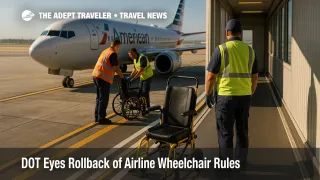DOT eyes rollback of airline wheelchair rules

The U.S. Department of Transportation is preparing to revisit several Biden-era protections for travelers who use wheelchairs, with a rulemaking push expected in 2026. The department's semiannual agenda also tees up deregulatory changes to refund and fee-disclosure rules, signaling a broader rethink of airline consumer protections. Disability advocates and airlines are bracing for another round of comments, litigation, and operational changes.
Key Points
- Why it matters: Potential rollbacks could narrow airline wheelchair rules and weaken enforcement.
- Travel impact: Training, refunds when cargo holds cannot fit a chair, and notification rights may change.
- What's next: DOT targets 2026 proposals on refunds, fee disclosures, and parts of the wheelchair rule.
- Airlines sued to block the 2024 wheelchair rule, and DOT twice delayed enforcement.
- FAA 2024 law sets training at least every 18 months, limiting how far DOT can scale back.
Snapshot
DOT's December 17, 2024 wheelchair rule tightened standards for assistance, mishandled chair remedies, pre-departure and arrival notifications, and annual hands-on training for staff who assist wheelchair users or handle mobility devices. The rule took effect January 16, 2025, but DOT paused enforcement first to March 20, then to August 1, 2025, citing consistency reviews and ongoing litigation from Airlines for America and major carriers. The agency's latest regulatory agenda indicates it will re-examine four provisions, including liability for mishandled chairs, training frequency and timing, refunds when a preferred flight cannot stow a chair, and required notices of rights and loaner equipment. In parallel, DOT plans to rewrite refund and ancillary fee-disclosure rules in early 2026. Travelers who rely on wheelchairs should expect continued uncertainty through the comment period.
Background
Air travel remains fraught for wheelchair users, with damage, delays, and unsafe transfers still common. The 2024 final rule codified a rebuttable presumption that a wheelchair lost, delayed, damaged, or pilfered while in airline custody constitutes a violation, clarified repair or replacement obligations, and required pre-departure stowage confirmations and post-arrival unload notices. It also mandated annual hands-on training, competency demonstration, and consultation with disability organizations in program design. Congress weighed in through the 2024 FAA Reauthorization, directing minimum standards for aisle-chair and stowage training and requiring publication of cargo-hold dimensions and refunds when a device cannot be accommodated. Those statutory floors constrain how far DOT can relax requirements, even if it seeks to adjust cadence or scope.
Latest Developments
DOT signals 2026 rewrite of airline wheelchair rules
DOT's semiannual agenda lists a re-examination of parts of the wheelchair rule finalized in 2024. Areas on the table include how mishandlings trigger enforcement, whether refresher training must remain annual or align closer to an 18-month cycle, what happens when a traveler must switch to a more expensive flight due to cargo-hold limits, and how, when, and what airlines must tell passengers about rights, loaners, and repairs. While timelines for this specific disability docket are not yet pinned to a month, the agenda makes clear that related consumer files will move in 2026, indicating a similar horizon for changes to airline wheelchair rules.
Trump DOT moves to trim refund and fee rules in 2026
The agency set February 2026 for a refunds NPRM that would revisit what counts as a cancellation, timelines for bag delivery, automatic ancillary-fee refunds, and obligations during serious communicable disease events. A March 2026 NPRM would "examine rescinding" parts of the 2024 ancillary fee-disclosure rule, designated deregulatory under the current Executive Order. Together, these moves align with industry's challenge to the wheelchair rule and the administration's stated intent to reduce regulatory burdens, even as disability and consumer groups warn of backsliding.
Analysis
For travelers who use wheelchairs, the most consequential questions are enforcement thresholds, training cadence, and make-good remedies when equipment cannot fly. DOT's final rule deliberately chose an annual hands-on training cycle, arguing it improves safety and dignity, while acknowledging the FAA law's 18-month minimum. If DOT harmonizes to 18 months, airlines would gain scheduling flexibility, but any perceived slip in proficiency could raise mishandling risk. On refunds, Congress expressly required carriers to publish cargo-hold dimensions and offer refunds when devices will not fit. DOT can refine implementation details, but it cannot erase statutory rights. Notification rules, including pre-departure stowage status and post-arrival unload confirmations, are operationally feasible for larger carriers with baggage tracking, yet burdensome for smaller operators, which makes them likely targets in a deregulatory rewrite. Legally, the pending industry lawsuit and the agency's own enforcement pauses have already created a limbo that undermines certainty. Practically, airlines should continue investing in device tracing, load-planning, and specialized training to lower mishandling rates, which remain the surest way to reduce exposure regardless of where the final line is drawn.
Final Thoughts
Expect a long runway of proposals, comments, and potential court rulings before any rollback meaningfully alters day-to-day travel. Statutory floors from the 2024 FAA law limit how far DOT can go, and the agency's own record recognizes the stakes for safe, dignified mobility. Until new rules are finalized, travelers should document conditions, confirm cargo dimensions in advance, and know their rights on repairs, loaners, and refunds. We will track each docket as it opens and translate the implications for airline wheelchair rules.
Sources
- Department Regulatory and Deregulatory Agenda; Semiannual Summary, Federal Register
- Agency Rule List, Spring 2025, Reginfo.gov
- Increasing Flexibility on Disclosure of Airline Ancillary Fees, Reginfo.gov
- Airline Refunds and Other Consumer Protections III, Reginfo.gov
- Final Wheelchair Rule, Federal Register, Dec. 17, 2024
- DOT enforcement discretion to Aug. 1, 2025, Federal Register
- U.S. airlines challenge wheelchair rule, Reuters
- NCD letter urging enforcement of Wheelchair Rule
- Travel Weekly, DOT again postpones enforcement of wheelchair rules
